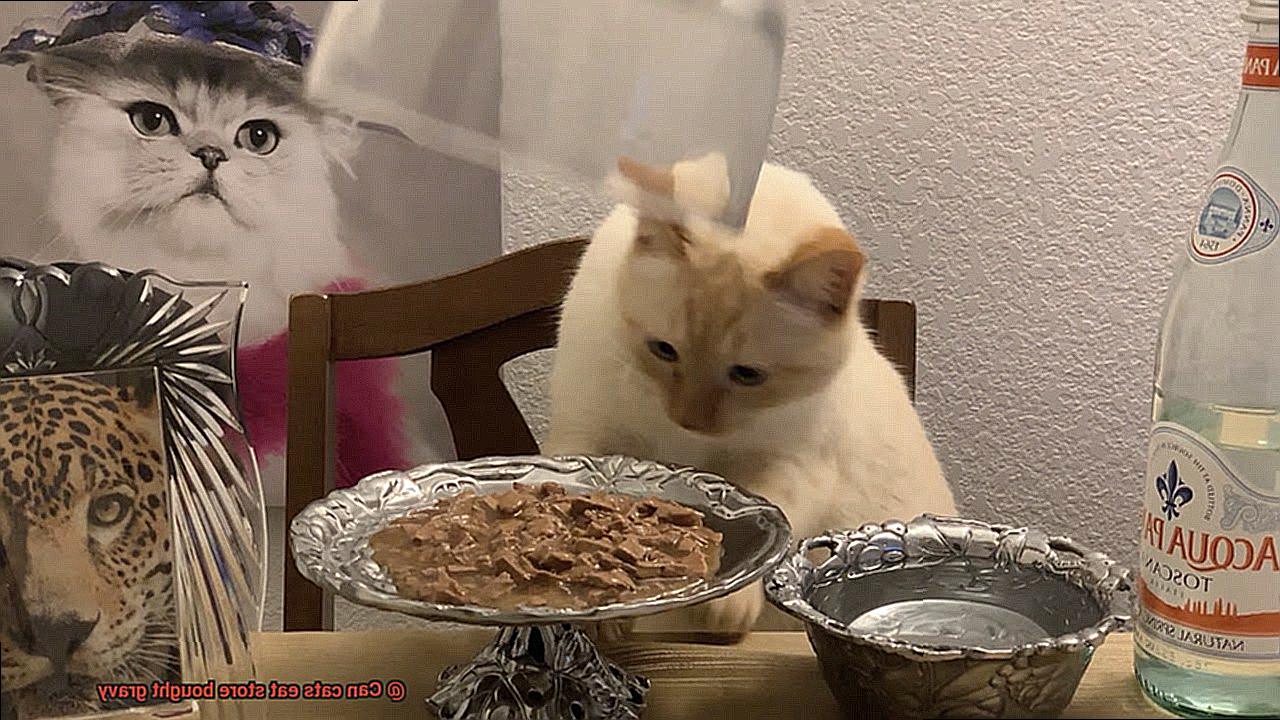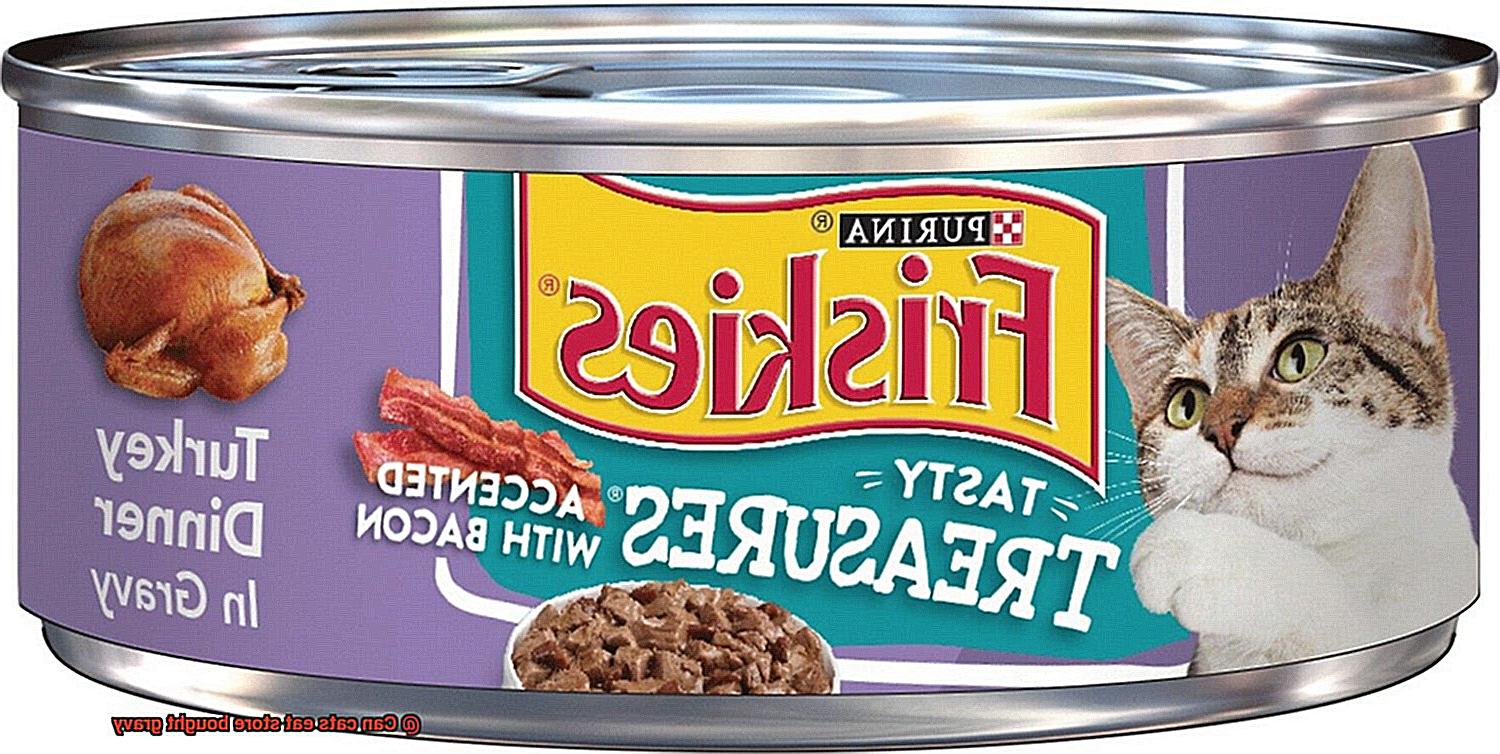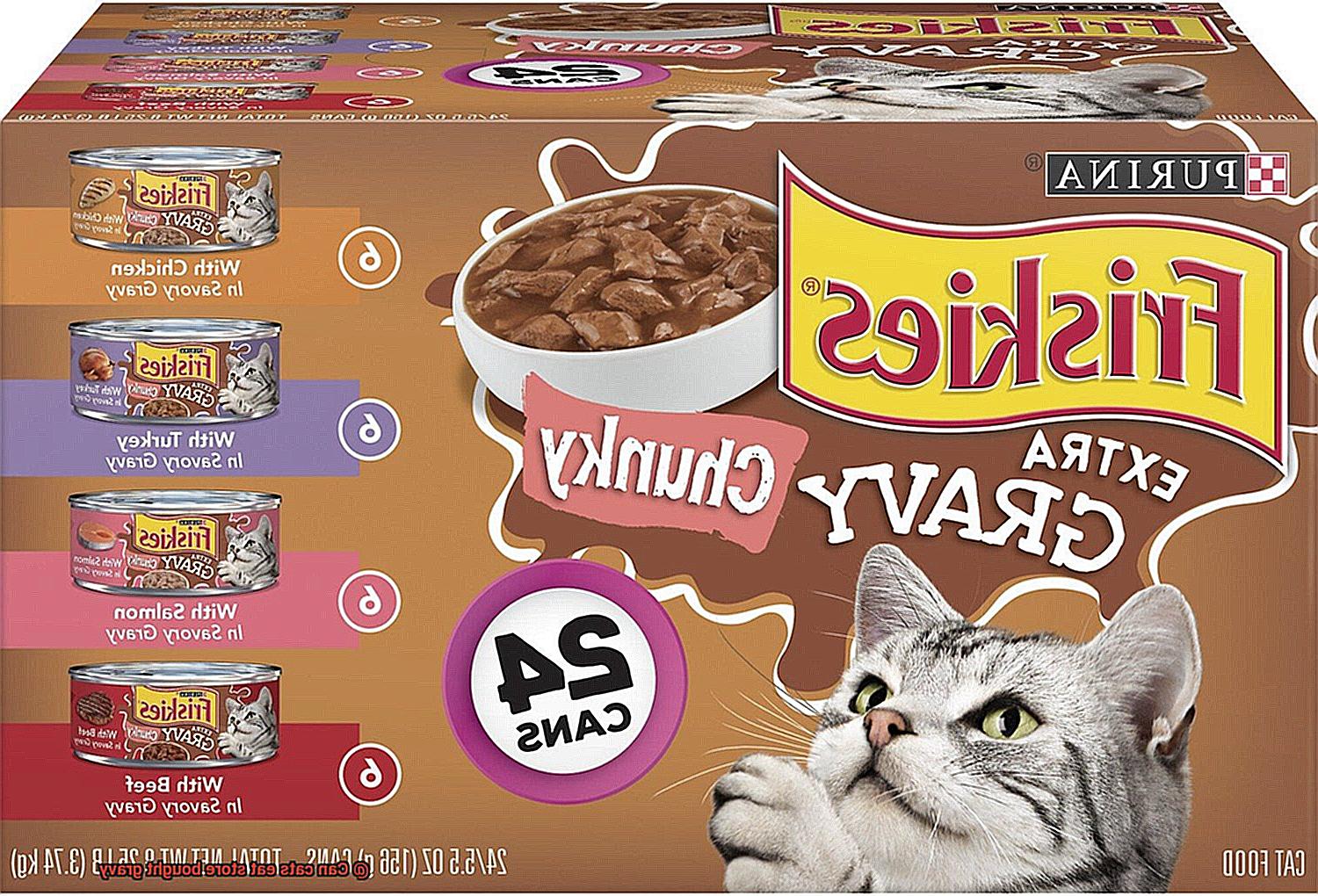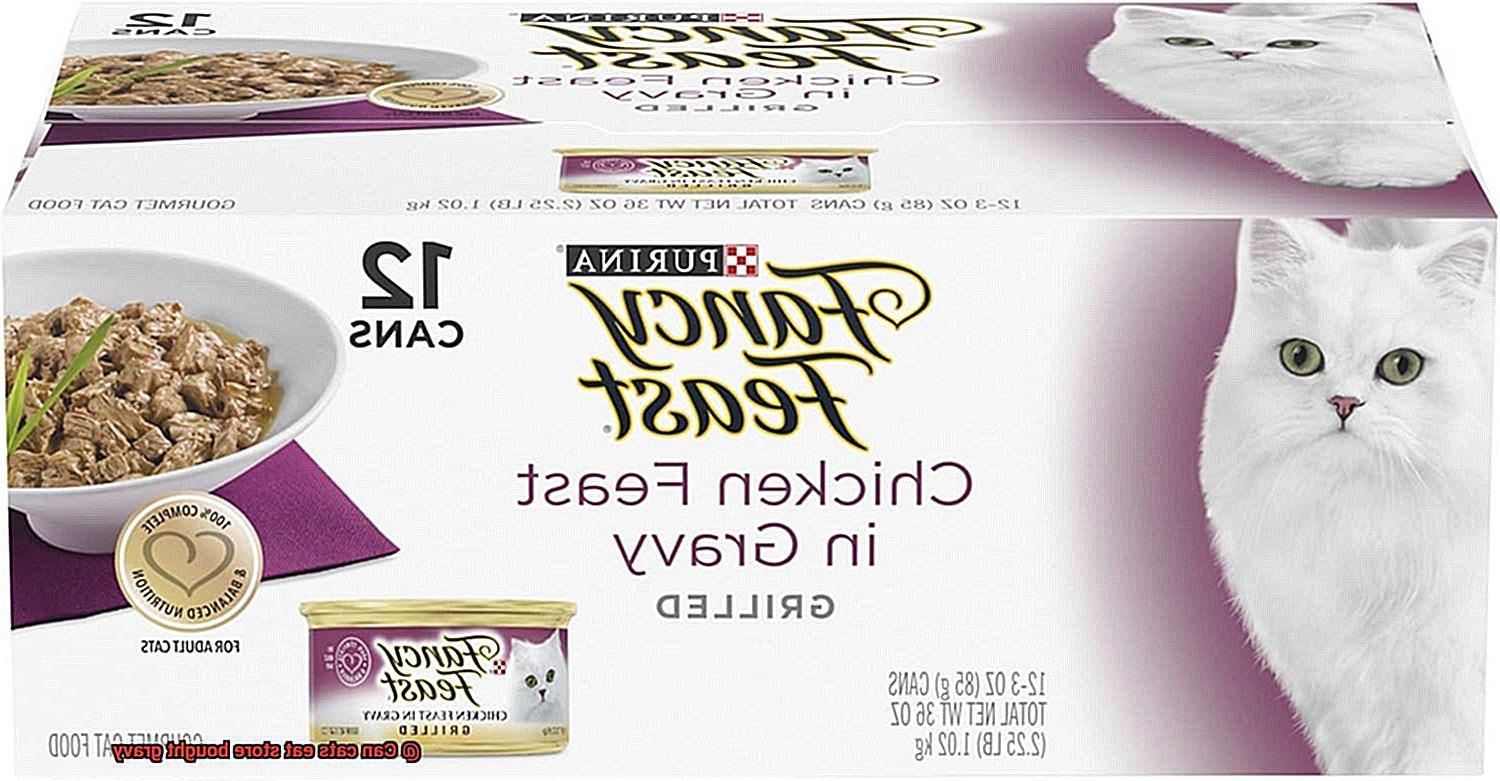Do you love spoiling your furry feline with the occasional treat? Are you constantly on the hunt for new foods to satisfy your cat’s taste buds? If that sounds like you, then you’ve probably wondered whether cats can eat store-bought gravy. Well, wonder no more, because we’re here to give you the lowdown.
It’s natural to want to treat your cat to something tasty, but it’s essential to understand what foods are safe for them. While homemade gravy made with cat-friendly ingredients is a fantastic addition to their diet, store-bought gravy may not be as safe. It’s crucial to remember that cats have specific dietary requirements, and straying from their diet could lead to serious health issues.

That’s why we’ve put together this article – to help you determine whether store-bought gravy is suitable for your cat or not. We’ll explore the various ingredients used in commercial gravies and explain the risks of feeding it to your feline friend. Plus, we’ll also discuss the benefits of homemade gravy and offer some tips on how to make it yourself.

So, join us on this informative journey as we uncover everything you need to know about whether cats can eat store-bought gravy.
What is Store Bought Gravy?
While it may be tempting to add some store-bought gravy to their meals for a little extra flavor, it’s crucial to be mindful of what we feed them. So, what is store-bought gravy?
Store-bought gravy is a popular condiment used in many households to add flavor to various dishes. It’s typically made from meat drippings or broth, flour, and seasonings. However, not all store-bought gravies are created equal, and some can contain ingredients that could be harmful to your cat’s health.

Before feeding your cat any type of store-bought gravy, it’s essential to read the ingredient list carefully. Gravies that contain onions, garlic, or other seasonings could be toxic to cats, causing gastrointestinal upset and even anemia. Additionally, some brands may use thickening agents such as xanthan gum or carrageenan, which could cause digestive issues in cats.
So, how can you ensure that your cat stays safe while still enjoying their meals? Here are some tips:
- Always read the label before feeding your cat any type of new food or supplement.
- Gravies that contain onions, garlic or other seasonings are not safe for cats.
- Some brands may use thickening agents that could cause digestive issues in cats.
- If your cat has a sensitive stomach or has experienced digestive issues in the past, it’s best to introduce store-bought gravy slowly and in small quantities to gauge their tolerance.
- To ensure your cat’s safety, it’s always best to avoid feeding them store-bought gravy altogether.
Benefits of Feeding Cats Store Bought Gravy
Not only does it add some much-needed flavor and moisture to dry food, but it also offers a plethora of health benefits.
Firstly, adding gravy to your cat’s diet is an excellent way to enhance the taste and texture of dry food. For finicky eaters or cats with dental issues, gravy can make mealtime more enjoyable and easier to swallow. This added bonus can be especially helpful for older cats who may struggle with chewing or cats on restricted diets.

In addition, store-bought gravy provides extra moisture to your cat’s diet, which is crucial for their overall health and well-being. Cats have a low thirst drive and may not drink enough water on their own, leading to dehydration and urinary tract infections. By incorporating gravy into their diet, you’re increasing their water intake and keeping them hydrated.
Furthermore, feeding your cat store-bought gravy can make mealtime more enjoyable for both you and your feline friend. It’s an opportunity to add some excitement to their routine and bond with them while providing extra nutrients.
However, not all store-bought gravies are created equal. Some contain harmful ingredients like artificial flavors, preservatives, and other additives that can be detrimental to your cat’s health. Always read the label carefully and choose products specifically made for cats without any harmful additives.
Potential Risks of Feeding Cats Store Bought Gravy

Before you reach for that store-bought gravy, it’s important to be aware of the potential risks that come along with it.
First and foremost, feeding cats store-bought gravy can lead to obesity. These gravies are often high in calories and fat, which can cause weight gain over time. This is a serious issue, as obesity can lead to a host of health problems such as diabetes, heart disease, and joint issues.
But the risks don’t stop there. Store-bought gravies are often loaded with preservatives, artificial flavors, and colors that can be harmful to cats. Cats have sensitive digestive systems, and feeding them food containing these additives can lead to gastrointestinal upset such as vomiting, diarrhea, and other digestive issues. This is particularly problematic for cats with underlying medical conditions such as kidney disease or inflammatory bowel disease.
In addition to the potential for obesity and gastrointestinal issues, some store-bought gravies contain high levels of sodium. While cats do need some salt in their diet, too much can lead to dehydration and put a strain on their kidneys.
And the dangers don’t end there. Many store-bought gravies contain ingredients that are toxic to cats. Onion powder is a commonly used ingredient in gravies that can be harmful if consumed in large quantities. Other ingredients such as garlic, chives, and leeks can also be toxic to cats and should be avoided.
So what’s the solution? To keep your cat healthy and happy, it’s best to stick with a high-quality cat food that is specifically formulated for their nutritional needs. This will provide them with the right balance of nutrients without any harmful additives or excess calories.
How to Choose the Right Store Bought Gravy for Your Cat
Feeding your feline friend can be a difficult task, but adding store bought gravy to their meals can make it more enticing and nutritious. However, choosing the right store bought gravy for your cat requires careful consideration. Here are some tips to help you choose the perfect gravy for your furry friend.
Read the Ingredients Carefully
Before selecting a store bought gravy for your cat, read the ingredients list carefully. Look for gravies that are made with high-quality, natural ingredients and avoid any that contain fillers, artificial preservatives, or by-products. Additionally, make sure that the gravy does not contain harmful ingredients like onions or garlic powder, which can cause serious health issues for your cat.
Choose a Cat-Specific Gravy
Human gravies may contain high levels of salt and other ingredients that are not suitable for feline consumption. It’s important to choose a gravy that is specifically made for cats. Look for products that are labeled as “cat-friendly” or “cat-specific” to ensure that the gravy is formulated with your cat’s nutritional needs in mind.
Consider Consistency and Flavor
Cats have their own preferences when it comes to flavors and textures. It’s important to choose a gravy that your cat will enjoy and that complements their regular food. Experiment with different textures and consistencies to see what your cat prefers. Some cats may prefer a thicker gravy while others may prefer a thinner, more liquid consistency.
Check for Dietary Restrictions
Your cat’s overall health and dietary needs should be considered when selecting a store bought gravy. If your cat has any dietary restrictions or health issues, be sure to choose a gravy that is appropriate for their specific needs. For example, if your cat has a sensitive stomach or is allergic to certain ingredients, look for gravies that are formulated for sensitive stomachs or that are made with hypoallergenic ingredients.
Introduce Gradually
When introducing a new store bought gravy to your cat’s diet, start with small amounts to ensure that they tolerate it well. Be sure to monitor your cat’s behavior and health closely after introducing a new food or treat.
Tips for Introducing Store Bought Gravy to Your Cat’s Diet
Adding store-bought gravy can be a great way to make mealtime more exciting for them. However, it’s important to introduce it to their diet carefully and thoughtfully. Here are five tips to help you do just that.
Gradual Introduction
Cats are creatures of habit and don’t always take kindly to change. Start by introducing small amounts of gravy mixed in with their regular food. Slowly increase the amount over time, allowing your cat’s digestive system to adjust to the new addition.

Quality Check
Not all gravies are created equal. Choose a high-quality product made with natural ingredients and free from harmful additives and preservatives. This will ensure that your cat stays healthy and happy.

Check for Allergies
Before introducing any new food to your cat’s diet, check for any allergies or sensitivities they may have. Consult with your vet if you’re unsure.

Monitor Your Cat’s Reaction
Keep a close eye on your cat’s reaction to the gravy. If they show any signs of discomfort or digestive issues, stop feeding them the gravy immediately.
Serve in Small Portions
While store-bought gravy can be a tasty addition to your cat’s diet, it should be served in moderation. Overfeeding your cat with gravy can lead to health issues such as obesity or digestive problems.
Signs That Your Cat May Not Be Tolerating Store Bought Gravy Well
Adding store-bought gravy to their meals can be a great way to give them some variety and excitement. However, not all cats can tolerate it well. To ensure that your cat is happy and healthy, it’s important to watch out for the following signs that they may not be tolerating store-bought gravy well.
- Vomiting: If your cat vomits after consuming store-bought gravy, it could be a sign that their stomach is having trouble digesting it. While occasional vomiting may not necessarily be concerning, if it happens regularly, it’s best to avoid feeding your cat store-bought gravy altogether.
- Diarrhea or loose stool: Diarrhea can also indicate that your cat’s digestive system is struggling to process the ingredients in store-bought gravy. If you notice any changes in your cat’s stool consistency or frequency after giving them store-bought gravy, it’s best to stop feeding it to them and consult your veterinarian.
- Skin irritation or itching: Some cats may have an allergic reaction to one or more of the ingredients in store-bought gravy, leading to skin irritation or itching. If you notice your cat excessively scratching or licking their skin after eating store-bought gravy, try switching to a different type of food or consult your veterinarian.
- Refusing food or lack of appetite: Cats are known for being picky eaters, but if they suddenly start refusing their food or show a lack of appetite after eating store-bought gravy, this could be a sign that they’re not tolerating it well. Try eliminating the store-bought gravy from their diet and see if their appetite returns.
To prevent any health issues from arising when introducing store-bought gravy into your cat’s diet, introduce it gradually, choose high-quality products, check for allergies in advance, and monitor your cat’s reaction closely. Serve it in small portions to avoid any health issues. If you notice any of the above signs, consult with your veterinarian for the best course of action.
Alternatives to Store Bought Gravy for Cats
While store-bought gravy may seem like a tasty addition to their meals, it’s important to note that it may not be the healthiest option. Often, it contains high levels of salt, preservatives, and artificial flavors, which can cause long-term harm to our furry companions.
Thankfully, there are plenty of alternatives to store-bought gravy that you can use to add flavor and moisture to your cat’s meals. Let’s explore some of the best options available:
Homemade Gravy
One of the best alternatives is making your own homemade gravy using simple ingredients such as chicken or beef broth, cornstarch, and water. By doing so, you can control the ingredients and ensure that your cat is getting a healthy and tasty addition to their meal. Not only is it a healthier option, but it’s also easy to make.
Wet Food or Canned Tuna
Another great alternative is adding wet food or canned tuna to your cat’s meals for added flavor and moisture. Wet food contains more water than dry food and can help with hydration while preventing urinary tract issues in cats. Canned tuna is also an excellent option as it contains high levels of protein and omega-3 fatty acids, which are essential for your cat’s overall health and well-being.
Bone Broth
Bone broth is another healthy alternative to store-bought gravy that provides many nutritional benefits. It is rich in nutrients such as collagen, glucosamine, and chondroitin, which can help improve joint health and boost the immune system. You can make your own bone broth using chicken or beef bones, vegetables, and herbs or purchase it from a pet store.
x2XGLSvqfHc” >
Conclusion
In conclusion, it’s important to approach store-bought gravy with caution when it comes to feeding your feline friend. While it may seem like a tasty treat, many commercial gravies contain harmful additives, preservatives, and excessive amounts of salt that can lead to health issues such as obesity and digestive problems in cats. Moreover, there are certain ingredients like onions and garlic that can be toxic to our furry companions.
But don’t worry. There are plenty of healthier alternatives available that can provide your cat with the flavor and nutrition they crave. Homemade gravy made with cat-friendly ingredients is an excellent option for those who want full control over what their pet is eating. Another alternative is wet food or canned tuna which offers added moisture and taste while providing adequate nutrition. Bone broth is also an excellent source of nutrients that can help support your cat’s overall health.
When introducing any new food or supplement to your cat’s diet, it’s essential to take things slow and monitor their reaction closely. Always read the label carefully before feeding them anything new and choose products specifically made for cats without any harmful additives.
By being mindful of what we feed our beloved pets, we can help ensure they live happy and healthy lives. So next time you’re thinking about adding some store-bought gravy to their meals, consider trying one of these alternative options instead.







